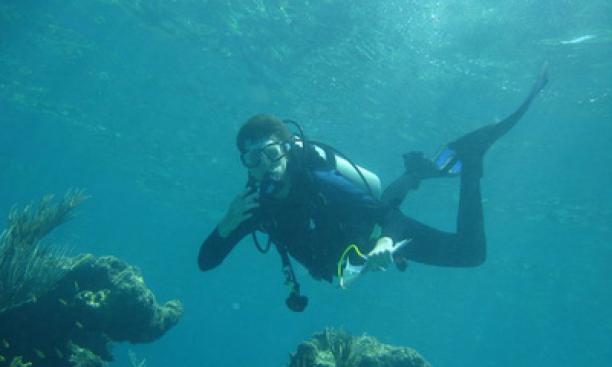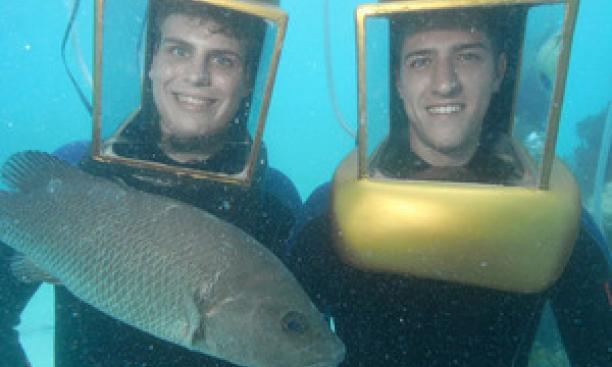

Eric Traub '14 conducts a fish survey on one of Bermuda's rim reefs. (Courtesy Chelsea Parker '14)
Those complaints turned out to be fleeting. When I think back on summer school now, I don’t think about the late nights or the early mornings or the three-hour midterm or the 14-page lab reports. Now when people ask me what Bermuda was like, the only words that come to mind are from my good friend and roommate Chris Luminais ’13: “It’s definitely the most fun I’ve ever had while being bludgeoned repeatedly with a textbook.”
This summer I was one of 15 students in Princeton’s Marine Biology Summer Seminar, a four-week course taught 782 miles southeast of Nassau Hall at the Bermuda Institute for Ocean Sciences (BIOS). The course is the brainchild of Professor Jim Gould, who brought along his wife, Carol (Dr. Carol, to us), as a self-described “de facto mother” for the group. Neither seems capable of discussing aquatic ecosystems without referencing Finding Nemo, if only to make a delightfully dry ironic comparison. In Bermuda, the two taught alongside Dr. Samantha de Putron (Dr. Sam) who was a coral reef biologist on the faculty at BIOS, as well as an undergraduate teaching assistant who put in even longer hours than we did.
We were submerged constantly in oceanography, ecology, and biology, and since there was no natural division in our day between school time and social time, the two fused together until our lunch conversations turned into precepts and our dinner conversations turned into a proving-ground for ideas that would be written about in lab reports later that night. “We would end up in these wondrously nerdy, terrific conversations that all centered on marine biology,” recalled Luminais.
When I signed up for the course, I imagined myself studying with steel drum music wafting through the air and a daiquiri at my side. Now I know that Bermuda isn’t just a vacationer’s paradise: It’s a living lab a cut above America’s best ocean research facility — Woods Hole Oceanographic Institution in Massachusetts — when it comes to teaching. Compared to Bermuda, Woods Hole is “a boring place,” said Gould. “No mangroves, no intertidal, crummy beaches, no reefs ... I’ll take my students to a genuine field site.”
Indeed, the marine biology seminar embodied the perfect wedding between in-classroom and out-of-the-classroom learning. On campus, teaching labs can feel like busy work aimed at reproducing scientific results first obtained in the 19th century; labs in Bermuda asked relevant, unanswered questions about marine ecosystems using lectures as a jumping-off point. There was never a right answer. The labs seemed like “diet” versions of real theses.

During a hemet dive in Bermuda, Chris Luminais '13, left, and Gavin Schlissel '13 pose with Leroy the gray snapper. (Courtesy Greg Hartley)
It’s the same for me. I’ve blocked out memories of the early mornings, the late nights, the midterm, and the lab reports, but the memories of Diploria and Sargassum are still fresh. I find both in surprising places back home in California. That kind of learning — the kind that follows students out of the classroom and into their daily lives — that’s the kind that counts.
Gavin Schlissel ’13, a molecular biology major from Moraga, Calif., will join The Weekly Blog’s staff of student writers in the fall.

